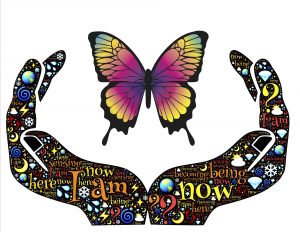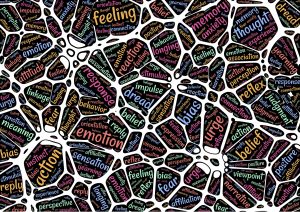
This article follows on from three previous blogposts. In the first I outlined the position of some modern (materialist) neuroscientists, which I perceive to be ridiculous. In the second I suggested some arguments against them. In the third I quoted the views of W. Macneile Dixon in support of my argument. I now want to go deeper into the issues, in a new series of articles, and investigate more thoroughly the nature of consciousness and the psyche. I’ll state in advance that I shall be arguing that the self is not an illusion.
Does any of this matter to anyone apart from those with an interest in psychology and metaphysics? I think it does, for the answer to the question in the title has profound implications for society, specifically the legal system for, if there is no self, how can anyone ever be held responsible for crimes? Society, unsurprisingly, takes absolutely no notice of this suggestion, and continues to put on trial and imprison criminals — what else can it do? And what is the point of the concept of rehabilitation of criminals, if there is no self to rehabilitate? The same problem exists for Christianity, which is the moral foundation of western society. One of its fundamental concepts is that of sin, and salvation. How can this be meaningful if there is no self to sin or be saved?
The attempt to deny the existence of the self is a difficult challenge, because the belief in it is deeply engrained in most peoples’ worldview. It would be hard to find a sane person on the planet who does not believe that, upon waking, he or she is the same person who went to sleep the previous evening. Yet we are invited to believe by neuroscience that this continuity of personhood, the self, is actually an illusion. The most forceful statement of which I am aware was made by Nobel prize winner Francis Crick, who opened his book on his “scientific search for the soul” thus: “The Astonishing Hypothesis (his title) is that ‘You’, your joys and your sorrows, your memories and your ambitions, your sense of personal identity and free will, are in fact no more than the behaviour of a vast assembly of nerve cells and their associated molecules” (1). (Let us note that he says himself that the case he is arguing is astonishing.)
I think that the neuroscientists who argue this do so because they are dedicated materialists/ atheists, who believe that consciousness is generated by the brain; they are therefore unwilling in principle to find any other explanation acceptable. So it is interesting that this viewpoint is apparently echoed by some spiritual traditions, at least at the level of the surface words. I’ll mention here the system of Gurdjieff. His writing is often obscure — a friend of mine says that he “is an initiate writing for initiates” — so here I am going to use as a source one of his followers, Kenneth Walker, who is easier to read. He studied with Gurdjieff, and more directly with his best known disciple P. D. Ouspensky. This may therefore be a third-hand account, but when I say Walker in what follows, I assume that I am really saying Gurdjieff via Ouspensky, unless any reader has information or observations to the contrary (please contact me in the menu).

In his book A Study of Gurdjieff’s Teaching (2) Walker writes: “One of the most cherished and most ridiculous of these illusions is that (man) possesses a permanent ‘self’ or master ‘I’ which imparts uniformity to his life and controls his various functions”. He calls this an “absurd idea”. “There is no such thing within you as a permanent ‘I’ ”. His justification for saying this is that “Man “has not one ‘I’ but innumerable ‘Is’. They are continually replacing each other, one ‘I’ being there at one moment and another ‘I’ at the next moment. Every thought and every feeling can and does claim to be ‘I’ until it has been pushed into the background and its place taken by another competitive ‘I’ ”. Two things which encourage us to think we possess unity and permanence are the fact that we have a single body, and a permanent name, which give “an illusion of permanence and unity”, qualities which are “found to be entirely non-existent”. He continues: “Whereas I had no proof at all of the existence within me of any permanent thing which underwent changes I had plenty of evidence of the existence in me of change itself”.
He goes on to say that the idea of no permanent self is not new. He cites and praises David Hume, and concludes that “the thing which we have previously taken to be a ‘self’ always turns out to be nothing more than a sequence of perception, and surely this psychic procession within us, which never remains for one moment stationary but is always on the move, is quite unworthy of being accepted as a permanent self or soul”. Referring to another spiritual tradition, he then says that “the idea of the non-existence of any ‘self’ has been held by the Buddhists for thousands of years. To Buddhists, David Hume’s observations about the absence of anything a man can call a ‘self’ present no difficulty at all… Gautama Buddha is reputed to have said: ‘There are the petals, the pollen, the corolla and the stalk, but there is no lotus flower. There is this or that passing idea, this or that transitory emotion, this or that image but no organized whole behind them which can be called the ego, or the self’ ”. “The Buddhist uses the two words, ‘ego’ and ‘self’, merely as convenient terms for describing a changing combination of both physical and psychic phenomena. He realizes that everything within himself is dependent on something else and that nowhere is there anything which exists in its own right, independent and self-produced, unconnected with anything else — a veritable ‘I’ ”.

So Buddhism apparently agrees with the modern neuroscientific perspective. I’ll outline the opposing case in my next article.
Footnotes:
(1) Simon & Schuster, 1994, p3
(2) Jonathan Cape, 1965. The quotes come from chapter V, The Search for a Self.